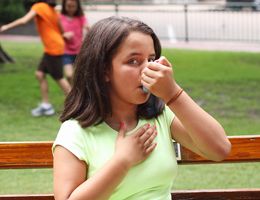Health library
Back to health libraryLearn the signs of asthma in kids
 Many things can cause children to cough. But sometimes a chronic cough can be a sign of something more serious: asthma.
Many things can cause children to cough. But sometimes a chronic cough can be a sign of something more serious: asthma. Asthma is a common disease. In the U.S. alone, about 6 million children have it. But the symptoms aren't always obvious. It usually starts before age 5, and young children may have a hard time voicing how they feel. This can make asthma tricky to detect.
Watch for signs
A frequent cough, often at night, is a common sign of asthma. The cough also may be worse when your child has a cold or is very active at play.
Kids with asthma may also:
- Have breathing problems, such as shortness of breath or fast breathing.
- Wheeze (make a whistling sound when they breathe out).
- Say that their chest hurts, a symptom known as chest tightness.
- Have a lot of colds that go to the chest.
If you think your child might have asthma, make an appointment to see their doctor.
Talk to the doctor
When you talk to your child's doctor about your concerns, let them know if you or your child's other parent has asthma or allergies. While any child can get asthma, it is more common when there is a family history of these conditions.
Your child's doctor may run tests to help find out if it's asthma. Or they may have your child try a medicine meant to improve breathing. If the medicine works, that could mean your child has asthma.
There's no cure for asthma, but treatment can help your child stay healthy. Treatment might include medicines and other changes to reduce your child's symptoms.
Avoid triggers
One way to help your child breathe better is to help them avoid things that trigger their asthma symptoms. Triggers are different for everyone. They often include:
- Dust.
- Pets.
- Mold.
- Pollen.
Your child's doctor can help you learn about your child's asthma triggers.
With proper treatment, children with asthma can breathe better, sleep better, and stay active and healthy.
Sources: American Academy of Allergy, Asthma, and Immunology; American College of Allergy, Asthma and Immunology Asthma and Allergy Foundation of America; National Institutes of Health
Reviewed 6/19/2025
